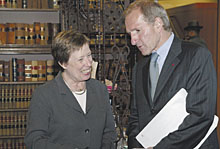For more archives, go to the Advance Archive/Search Page.
French Chief Justice Says
New Legal Culture Emerging
On the 200th anniversary of the famed Napoleonic Code, the head of the French Supreme Court says that the Code, important as it has been to legal systems worldwide, cannot stand on its own. Instead, it is giving way to an emerging globalized legal culture that integrates many different legal systems.
 |
|
Dean Nell Newton speaks with Guy Canivet, Chief Justice
of the Civil Supreme Court of France, in the Starr Hall
reading room. Canivet spoke at the law school in conjunction
with the bicentenary of the Napoleonic Code. |
"A new legal culture is being created for the whole of Europe," Chief Justice Guy Canivet told a distinguished legal audience Sept. 22 at the Law School.
This new culture is more than just an integration of common law and the legal systems on the continent, he said, pointing to the European Union as "a formidable melting pot for the creation of a new law for the whole of the old continent, a powerful machine for integrating the legal systems of each of the member states."
The address, titled "The Napoleonic Civil Code: Its Relevance to the Common Law World and Beyond," was timed to coincide with the global bicentenary celebration of the Napoleonic Code.
As president of the Cour de Cassation, France's highest and most important appellate court for civil matters, Canivet is at the forefront of adjudicating commercial law to keep France on a competitive footing with other nations.
His court deals with topics such as contracts, torts, insurance, primarily the sorts of things a state Supreme Court would deal with in the United States.
The Napoleonic idea was to create a simple legal code accessible to all and easy to apply by the practitioners, Canivet said. He noted that during the first century of its existence, the French Civil Code provided inspiration for many other countries' legal systems and continues to do so today.
Yet despite the French influence, in the francophone world "one dominant model has been replaced by fruitful competition, which encourages mutual borrowing of the best each of these systems has to offer," Canivet said.
Many other nations drew their inspiration from the Anglo-American common law system, which for two centuries has also been incorporated into the legislation in many countries, Canivet said.
"This diversity and these influences and counter-influences stand in the way of the domination of a single system," he said.
On the other hand, said Canivet, just as a global economic marketplace has emerged, modern legal circumstances call for the globalization of legal thought.
"The new legal thought must be comparative," he said. "Far from being based on a single model, this is achieved by comparing all the existing systems, each being judged solely on its merits."
Although some are concerned that the process will run aground on national legal traditions, Canivet said the "new legal thought derives its sources from the national tradition, yet it places it in the context of other traditions too."
In that sense, he said, it was reflecting the success of the United States. "Here there are different systems of law in the various states," he observed, "but that hasn't stood in the way of achieving economic compatibility."
Emperor of France, Napoleon ruled - the first time - from 1804 to 1814. He is celebrated for his military victories and demonized for his tyrannical rule. But his most lasting legacy for France and much of the world was the set of civil laws instituted in 1804 that is commonly referred to as the Code Napoleon. He took the existing civil law in Europe, which was largely based on Roman law, and put it into writing everyone could understand.
Civilian legal systems with codes like France tend to regard laws enacted by the legislature as the most important source of law. Civilian law is based on scholarly research and the drafting of legal code, which is passed into law by the legislative branch. It is then the judge's job to interpret that intent more than to follow judicial precedent.
In contrast, common law systems - like those in England and the U.S. - have laws made by legislatures too, but give great consideration to laws made by judges: the common law. Anglo-American common law is a system of law based on court precedent; laws and statutes are interpreted, and the ruling of one judge may influence or even control the ruling of another judge.
Differences between the two legal systems are now eroding.
"The Napoleonic Code was a fundamental step in the evolution of French law and the building of the modern French state and nation," said Peter Lindseth, an associate professor of law whose research focuses on the historical evolution of the administrativ e state in the 20th century and the relationship of administrative governance to the process of European integration. "This bicentenary celebration is akin to the 200th anniversary of the U.S. Constitution; it's regarded as that important."

